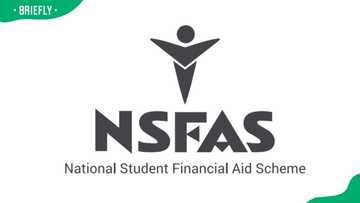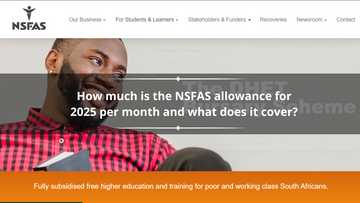All the necessary NSFAS required documents for 2022 application
The NSFAS bursary scheme (National Student Financial Aid Scheme) is under the Department of Higher Education & Training. The program provides monetary support to scholars who are financially incapable of paying for their studies. Ideally, find out NSFAS required documents for application before beginning the process to make your work easy and fast.
PAY ATTENTION: Click “See First” under the “Following” tab to see Briefly News on your News Feed!

Source: Facebook
NSFAS online application's opening and closing dates for 2022-2023 are from 1st September to 30th November 2022. The process happens at the same time yearly. Find out more about NSFAS requirements for 2022 below. After that, download the application form from the NSFAS' website and apply in good time to avoid rush hours.
What is needed to apply for NSFAS?
Submit NSFAS required documents for your application to be approved. Does NSFAS require certified documents? It has always been mandatory for applicants to certify their documents. Here are the documents needed to apply for NSFAS:
- Copy of your ID (Alternatively, provide your birth certificate).
- Copies of your parent/guardian/spouse's ID (if you depend on them and with their consent) to prove that they are aware of your bursary application.
- Download and fill out the consent form with your spouse/guardian/parent to show that they support your decision to apply for the bursary.
- Your parent/spouse/guardian's proof of income (whoever you depend on) to prove they do not earn more than R350 000 per year. What proof of income is needed for NSFAS? Use payslips/UIF letters/appointment letters/recruitment letters.
- An affidavit signed by the parent/guardians/spouse as proof of employment if they are in the informal sector.
Enjoy reading our stories? Download the BRIEFLY NEWS app on Google Play now and stay up-to-date with major South African news!

Source: Getty Images
- A retrenchment letter if the applicant or their guardian/spouse/parent does not have a source of income at the moment.
- If you earn money, submit your proof of income (a payslip or appointment letter of 3 months or less).
- A year's IRP5 form to avoid legal complications associated with NSFAS.
- You do not need proof of income if you are a SASSA recipient. Provide a certified copy of the SASSA letter if you or any family member is a SASSA's social grants' beneficiary.
- A Vulnerable Child Declaration (for the orphaned and vulnerable applicants). It should be complete and signed, preferably by the social worker who has worked with the applicant. The social worker can also fill out this applicant's consent form instead of guardians or parents.
- Confirm you are orphaned by providing your parent(s) death certificate(s).
- Prove you are a vulnerable child (one who does not have a steady family) by submitting a divorce decree. It also applies to applicants who have separated from their spouses but are yet to divorce.
- Those with disabilities need Disability Annexure A (complete and signed). You might receive the bursary even if your parent/guardian/spouse earns over R350 000 per annum.
What does the NSFAS bursary cover?

Source: Getty Images
The student aid program primarily covers registration and tuition fees. It also provides the scholar with allowances for food, learning materials, personal care, accommodation and transport. Those with disabilities receive money for assistive devices, medical assessments, and human support like tutors, caregivers, sign-language interpreters, scribes, or guide dogs.
Who qualifies for NSFAS?
South African citizens (students from poor and working-class families) who meet the NSFAS application requirements discussed above and plan to study in the country's public higher learning institutions qualify for this bursary. In summary, they must also fall within or below these categories:
- All SASSA grant recipients.
- Must have begun studying before 2018 and have an annual household income of R122 000 or less.
- Have a combined household income of R350 000 (per year) or less.
- Persons with disabilities with a combined household yearly income is R600 000 or less.

Source: Getty Images
Ensure that your NSFAS supporting documents are clear and eligible. Use the same names throughout your official papers to avoid discrepancies. The consistency in your names confirms that the NSFAS documents needed or submitted are yours. The details about NSFAS required documents in this article will assist you with the process.
READ ALSO: How to apply for bursaries in South Africa
Briefly.co.za also shared how to apply for bursaries in South Africa. Government agencies, corporates, NGOs, and other community organizations are willing to spend money on your education.
Most of them cover a student's tuition fees in the form of bursaries and do not request anything in return. Organizations like MultiChoice only sponsor scholars studying courses related to their context. Find out everything you need to know about applying for bursaries here!
Source: Briefly News




